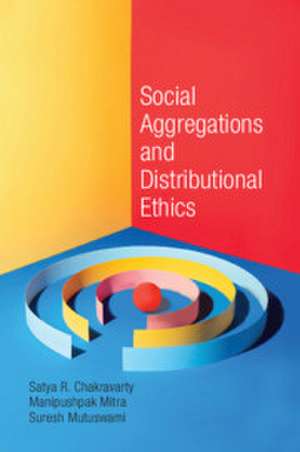Social Aggregations and Distributional Ethics
Autor Satya R. Chakravarty, Manipushpak Mitra, Suresh Mutuswamien Limba Engleză Paperback – 10 mai 2023
| Toate formatele și edițiile | Preț | Express |
|---|---|---|
| Paperback (1) | 234.86 lei 6-8 săpt. | |
| Cambridge University Press – 10 mai 2023 | 234.86 lei 6-8 săpt. | |
| Hardback (1) | 607.93 lei 6-8 săpt. | |
| Cambridge University Press – 10 mai 2023 | 607.93 lei 6-8 săpt. |
Preț: 234.86 lei
Nou
Puncte Express: 352
Preț estimativ în valută:
44.94€ • 48.06$ • 37.47£
44.94€ • 48.06$ • 37.47£
Carte tipărită la comandă
Livrare economică 18 aprilie-02 mai
Preluare comenzi: 021 569.72.76
Specificații
ISBN-13: 9781108927635
ISBN-10: 1108927637
Pagini: 250
Dimensiuni: 151 x 229 x 16 mm
Greutate: 0.36 kg
Ediția:Nouă
Editura: Cambridge University Press
Colecția Cambridge University Press
Locul publicării:Cambridge, United Kingdom
ISBN-10: 1108927637
Pagini: 250
Dimensiuni: 151 x 229 x 16 mm
Greutate: 0.36 kg
Ediția:Nouă
Editura: Cambridge University Press
Colecția Cambridge University Press
Locul publicării:Cambridge, United Kingdom
Cuprins
Preface; 1. Introduction; Bibliography; 2. Individual and social orderings; 2.1. Introduction; 2.2. relations; 2.3. Preference relations and choice sets; 2.4. Social orderings, quasi-orderings and weak quasi-orderings; 2.5. Exercises; 2.6. Bibliographical notes; bibliography; 3. May's theorem; 3.1. Introduction; 3.2. The framework; 3.3. May's theorem; 3.4. Robustness of the axioms; 3.5. Exercises; 3.6. Bibliographical notes; Bibliography; 4. Arrow's theorem with individual preferences; 4.1. Introduction; 4.2. The framework; 4.3. The Arrow Impossibility theorem; 4.4. Two proofs of Arrow's theorem; 4.5. Exercises; 4.6. Bibliographical notes; Bibliography; 5. Relaxing Arrow's axioms; 5.1. Introduction; 5.2. Relaxing Weak Pareto; 5.3. Relaxing transitivity of (Social) binary relations; 5.4. Domain restriction: single peaked preferences; 5.5. Exercises; 5.6. Bibliographical notes; Bibliography; 6. Arrow's theorem with utilities; 6.1. Introduction; 6.2. The framework and assumptions; 6.3. Measurability and comparability; 6.4. Arrow's theorem; 6.5. Positional dictatorships; 6.6. Leximin; 6.7. Utilitarianism; 6.8. Exercises; 6.9. Bibliographical notes; Bibliography; 7. Harsanyi's Social Aggregation theorem; 7.1. Introduction; 7.2. The model; 7.3. Appendix; 7.4. Illustrative examples; 7.5. Exercises; 7.6. Bibliographical notes and discussions; Bibliography; 8. Distributional ethics I; 8.1. Introduction; 8.2. Basics and preliminaries; 8.3. Common features; 8.4. The direct approach; 8.5. The inclusive-measure of well-being approach; 8.6. Direct descriptive inequality indices and reduced form welfare functions; 8.7. Measuring inequality within the Harsanyi framework; 8.8. Comparability between achievement and shortfall inequality: an expository analysis; 8.9. Equality of opportunity: an illustrative discussion; 8.10. Inequality and welfare with an ordinal dimension of well-being; 8.11. Inequality as an ordinal notion; 8.12. Fairness in network resource allocation: an analytical exposition; 8.13. Exercises; 8.14. Bibliographical notes; Bibliography; 9. Distributional ethics II; 9.1. Motivations; 9.2. Basics and preliminaries; 9.3. Common features; 9.4. The direct approach; 9.5. The inclusive-measure of well-being approach; 9.6. Direct descriptive multidimensional inequality indices and reduced form welfare functions; 9.7. Inequality under uncertainty: a brief discussion; 9.8 Exercises; 9.9 Bibliographical notes; Bibliography; 10. Social choice functions; 10.1. Introduction; 10.2. The framework and the Gibbard-Satterthwaite theorem; 10.3. Two proofs of the Gibbard-Satterthwaite theorem; 10.4. Single-peaked preferences; 10.5. Exercises; 10.6. Bibliographical notes; Bibliography; 11. Strategyproofness on quasi-linear domains; 11.1. Introduction; 11.2. The pure public goods problem; 11.3. Allocation of a single indivisible object; 11.4. Relaxing outcome efficiency: Affine maximizers; 11.5. Exercises; 11.6. Bibliographical notes; Bibliography; Index.
Notă biografică
Descriere
Ranking social states using individual rankings, strategic and non-strategic behaviors of individuals, ethical issues in distributional analysis.
